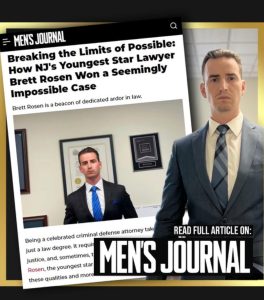Navigating the Graves Act in Elizabeth, NJ: A Comprehensive Guide by Brett M. Rosen, Esq.
Elizabeth, NJ Graves Act Lawyer

Elizabeth, NJ Graves Act Lawyer
If you’re facing a Graves Act case in Elizabeth, NJ, retaining Brett M. Rosen, Esq. could be your best decision. Known for his exceptional legal acumen and a track record of high-stakes courtroom victories, Rosen has consistently demonstrated his ability to navigate complex legal landscapes with precision and dedication. His recent triumph in Union County Superior Court, where he secured a directed verdict for his client, underscores his expertise in discrediting prosecution evidence and creating reasonable doubt. Rosen’s meticulous approach and profound understanding of criminal law make him a formidable advocate for those facing serious charges under the Graves Act. Additionally, his recognition as one of Law & Crime’s Top Attorneys and his consistent inclusion in the Thomson Reuters Super Lawyers Rising Stars list highlight his standing in the legal community. With Rosen’s proven ability to achieve favorable outcomes, you can trust that your case will be handled with the utmost skill and dedication.
Contact him today for a free consultation at 908-312-0368.
Understanding the Gravity of the Graves Act & Firearms Offenses
In the state of New Jersey, firearm offenses are taken very seriously, and the Graves Act is a cornerstone of its stringent gun control laws. If you’re facing charges related to firearms in Elizabeth, NJ, understanding the implications of the Graves Act and securing robust legal representation can be the difference between freedom and a lengthy prison sentence.
What is the Graves Act?
- The Graves Act, enacted in 1981 and codified under N.J.S.A. 2C:43-6, aims to deter gun violence by imposing mandatory minimum prison sentences and parole ineligibility for certain firearms offenses.
- Even for first-time offenders, the Graves Act can result in significant prison time without the possibility of early release.
- It’s essential to recognize the seriousness of these charges and seek experienced legal counsel immediately if you’re facing any firearms-related offenses in New Jersey.
Firearms Offenses Covered by the Graves Act
The Graves Act encompasses various firearms offenses, including but not limited to:
- Unlawful Possession of a Handgun: Possessing a handgun without a valid permit to carry.
- Unlawful Possession of a Firearm: Possessing certain firearms, such as rifles or shotguns, without proper registration or identification.
- Possession of a Weapon for an Unlawful Purpose: Possessing any weapon, including a firearm, with the intent to use it unlawfully against another person or property.
- Certain Persons Not to Have Weapons: Possessing a firearm if you have been convicted of certain crimes or are prohibited from owning a firearm due to other factors like a domestic violence restraining order.
- Defaced Firearms: Possessing a firearm with an altered or obliterated serial number.
- Manufacturing, Transporting, or Disposing of Firearms: Illegally manufacturing, transporting, or disposing of firearms.
Penalties Under the Graves Act

The Graves Act mandates severe penalties, including:
- Mandatory Minimum Prison Sentences: Even for first-time offenders, conviction under the Graves Act results in a mandatory minimum prison sentence. The length of the sentence depends on the specific offense, ranging from a few years to 10 years in prison.
- Parole Ineligibility: You must serve a significant portion of your sentence before becoming eligible for parole. This period is usually one-third to one-half of the sentence imposed, or three & 1/2 years, depending on the nature of events and the charge. For a fourth-degree crime the minimum is 18 months in prison, and the entire 18 months must be served. For a second-degree hand gun charge, the mandatory minimum is 42 months of parole ineligibility.
- Fines: In addition to imprisonment, you may also face substantial fines, which can range from thousands to hundred of thousands of dollars.
The Impact of the Graves Act on Your Life
A conviction under the Graves Act can have far-reaching consequences beyond just imprisonment and fines:
- Criminal Record: A felony conviction under the Graves Act will create a criminal record, which can negatively impact your ability to obtain employment, housing, education, and other opportunities.
- Loss of Firearm Rights: You will lose your right to own or possess firearms in the future.
- Immigration Consequences: For non-U.S. citizens, a conviction under the Graves Act can lead to deportation or denial of naturalization.
- Damage to Reputation: A conviction can tarnish your reputation and affect your relationships with family, friends, and community members.
Potential Defenses Against Graves Act Charges in Elizabeth, New Jersey
The specific defense strategies employed will depend on the unique facts and evidence of your case. Some common defenses that may be applicable include:
- Challenging the Legality of the Search and Seizure: If the police violated your Fourth Amendment rights by conducting an unlawful search or seizure, we can file a motion to suppress any evidence obtained illegally.
- Lack of Probable Cause: If the police lacked probable cause to arrest you or search your property, we can challenge the legality of the stop and the subsequent arrest.
- Lack of Intent or Knowledge: In some cases, we may be able to argue that you lacked the necessary intent to commit the offense or that you were unaware of the presence or illegal nature of the firearm.
- “Justifiable Need” Exception: In limited circumstances, if you can prove that you possessed the firearm for a “justifiable need,” you may be exempt from the mandatory minimum sentence under the Graves Act.
- Other Defenses: Depending on the specific facts of your case, other defenses might be applicable, such as:
- Self-defense
- Duress or Coercion
- Insufficient Evidence
- Mistaken Identity
- Prosecutorial Misconduct
Graves Act Waiver in New Jersey: A Chance for Leniency
The Graves Act in New Jersey imposes strict mandatory minimum prison sentences for certain gun-related offenses. However, a Graves Act Waiver provides a potential avenue for relief, allowing a judge to waive the mandatory minimum sentence and impose a lesser sentence or even probation, depending on the circumstances.
Eligibility for a Graves Act Waiver
To be eligible for a Graves Act waiver, you must meet two crucial criteria:
- First-Time Offender: You must not have any prior convictions for crimes involving violence or the threat of violence.
- “Interests of Justice”: The court must find that waiving the mandatory minimum sentence would not endanger the public safety and would serve the interests of justice.
Mitigating Factors Favoring a Graves Act Waiver
These are factors that the court will consider in your favor when deciding whether to grant a waiver:
- No Prior Criminal Record: A clean criminal history demonstrates that you are not a habitual offender and are less likely to re-offend.
- Non-Violent Offense: The circumstances surrounding your offense were not violent or did not involve the actual use of a firearm to threaten or harm anyone.
- Lack of Intent to Harm: You did not intend to cause harm or threaten anyone with the firearm.
- Circumstances Unlikely to Recur: The situation that led to the offense is unlikely to happen again.
- Remorse and Cooperation: You show genuine remorse for your actions and have cooperated fully with law enforcement.
- Mental Health or Substance Abuse Issues: You are suffering from a mental health condition or substance abuse issue that contributed to the offense, and you are actively seeking treatment.
- Strong Community Ties: You have strong ties to the community, such as stable employment, family support, and involvement in community activities.
Aggravating Factors Hindering a Graves Act Waiver
These are factors that the court will consider against granting a waiver:
- Serious Harm or Injury: Your actions resulted in serious harm or injury to another person.
- Use of a Firearm: The firearm was actually used during the commission of a crime or to threaten someone.
- Prior Criminal History: You have a prior criminal record, especially involving violent offenses or weapons charges.
- Risk of Re-offense: The court determines that you pose a risk to public safety or are likely to re-offend.
- Gang Affiliation or Organized Crime: You are involved in gang activity or organized crime.
- Lack of Remorse or Cooperation: You fail to show remorse for your actions or refuse to cooperate with law enforcement.
The Role of an Attorney in Seeking a Graves Act Waiver
Navigating the complexities of the Graves Act and obtaining a waiver requires experienced legal representation. A skilled attorney can:
- Thoroughly evaluate your case and assess your eligibility for a waiver.
- Gather and present evidence to support your waiver application.
- Craft a compelling argument highlighting the mitigating factors in your case.
- Advocate for your rights and interests in court.
- Negotiate with the prosecutor to seek a favorable resolution.
Frequently Asked Questions About the Graves Act in Elizabeth, NJ

- What is the Graves Act, and how does it affect me?
- The Graves Act is a New Jersey law that imposes mandatory minimum prison sentences and parole ineligibility for certain firearms offenses. If you’re convicted under the Graves Act, you’ll face significant jail time, even if it’s your first offense.
- Can I get a Graves Act waiver?
- In rare cases, a prosecutor may agree to waive the mandatory minimum sentence under the Graves Act. However, obtaining a waiver is challenging and requires a compelling argument and strong legal representation.
- What if I had the firearm for self-defense?
- While self-defense can be a potential defense, it’s important to understand that New Jersey has strict laws regarding the use of firearms for self-defense.
- Can I still own a firearm if I’m convicted under the Graves Act?
- No, a conviction under the Graves Act will result in the loss of your right to own or possess firearms in New Jersey.
- What should I do if I’m facing charges under the Graves Act?
- It’s essential to contact an experienced criminal defense attorney immediately. Don’t speak to the police or anyone else about the case without legal counsel present.
Additional FAQs:
1.What is the difference between unlawful possession of a handgun and possession of a weapon for an unlawful purpose?
Unlawful Possession of a Handgun: This charge specifically focuses on possessing a handgun without a valid permit to carry it. The focus is on the lack of proper authorization, regardless of your intent for having the handgun.
Possession of a Weapon for an Unlawful Purpose: This charge applies to any weapon, including firearms, when you possess it with the intent to use it unlawfully against a person or property. The emphasis here is on your intent to use the weapon for a criminal purpose.
2. Can I be charged under the Graves Act even if I didn’t actually use the firearm?
- Yes, the Graves Act can apply even if you didn’t actually use the firearm. The mere possession of a firearm under certain circumstances, such as during the commission of a crime or without a valid permit, can trigger the Graves Act’s mandatory minimum sentencing provisions.
3. What are the potential immigration consequences of a Graves Act conviction?
- A conviction under the Graves Act, especially for a firearm offense, can have severe immigration consequences for non-U.S. citizens. It can lead to deportation or make you inadmissible to the United States, even if you have a green card or other legal status.
4. How can an attorney help me if I’m facing charges under the Graves Act?
- An experienced criminal defense attorney can help you in numerous ways, including:
- Thoroughly investigating the circumstances of your arrest and the evidence against you.
- Challenging the legality of any searches or seizures that led to the discovery of the firearm.
- Exploring potential defenses, such as lack of intent, self-defense, or the justifiable need exception.
- Negotiating with the prosecutor to seek a reduction or dismissal of charges, or to argue for a Graves Act waiver.
- Representing you in court and advocating for your rights at every stage of the legal process.
- Working to minimize the potential penalties and consequences of a conviction.
5. What should I expect at my first court appearance for a Graves Act charge?
- Your first court appearance is typically CJP, where you’ll be read the charges and informed of your rights. The judge will also address the issue of conditions for your release. It’s critical to have an attorney present at your arraignment to ensure your rights are protected and to advise you on the best course of action.
More FAQs About the Graves Act in Elizabeth, NJ:
- What if I had a valid firearm permit from another state? Does the Graves Act still apply?
- Unfortunately, yes. The Graves Act applies even if you have a valid firearm permit from another state. To legally possess a firearm in New Jersey, you must have a valid New Jersey permit to carry or a Firearms Purchaser Identification Card (FPIC).
- Can I get a Graves Act conviction expunged from my record?
- Yes, in some cases, expungement might be possible if you received a Graves Act waiver and meet other specific criteria.
- What happens if I’m charged with multiple offenses under the Graves Act?
- If you’re charged with multiple Graves Act offenses, you may face consecutive sentences, meaning you’ll serve the mandatory minimum for each offense separately. This can result in a significantly longer period of incarceration.
- Can the Graves Act apply to antique firearms or BB guns?
- The Graves Act generally applies to firearms that are capable of firing a projectile. While antique firearms are generally covered by the Graves Act, BB guns may not be covered under the Graves Act, they could still be subject to other weapons offenses.
- What are the chances of getting a Graves Act waiver in Elizabeth, NJ?
- Obtaining a Graves Act waiver is challenging and requires a strong legal argument and presentation of mitigating factors. The success rate depends on the specific circumstances of your case, the strength of the evidence, and the prosecutor’s discretion.
- What if I believe the police violated my rights during the arrest or search related to the Graves Act charge?
- If your constitutional rights were violated during the arrest or search, your attorney can file a motion to suppress any illegally obtained evidence. This can significantly weaken the prosecution’s case and potentially lead to a dismissal of the charges.
Why Choose Brett M. Rosen, Esq. as Your Elizabeth Graves Act Attorney

Facing charges under the Graves Act is a daunting experience, but you don’t have to face it alone. Brett M. Rosen, Esq., and his team are dedicated to providing you with the aggressive representation and compassionate guidance you need to navigate this complex legal landscape. We offer:
- Extensive Experience in Graves Act Cases: We have a proven track record of success in defending clients against charges under the Graves Act.
- In-Depth Knowledge of NJ Gun Laws: We possess a comprehensive understanding of New Jersey’s firearm laws and the nuances of the Graves Act.
- Personalized Attention & Strategic Defense: We understand that every case is unique. We take the time to listen to your story, investigate the circumstances, and develop a tailored defense strategy to challenge the charges or seek a Graves Act waiver.
- Commitment to Protecting Your Rights and Future: We are dedicated to fighting for your rights and minimizing the impact of these charges on your life. We’ll work tirelessly to achieve the best possible outcome.
Don’t Face Graves Act Charges Alone – Contact Brett M. Rosen, Esq. Today
Facing charges under the Graves Act is a serious matter with potentially devastating consequences. Don’t navigate this complex legal battle alone. Contact Brett M. Rosen, Esq., today for a free and confidential consultation. We will review your case, explain your rights, and fight tirelessly to protect your freedom and future.
Call us now at 908-312-0368 or email us at brett@nynjcriminalcivilesq.com to schedule your free consultation. We’re ready to provide you with the experienced and aggressive representation you need to achieve the best possible outcome.
Disclaimer: The information provided on this page is for general informational purposes only and does not constitute legal advice. It is crucial to consult with an experienced attorney regarding your specific legal situation.
Remember, your future is worth fighting for. Take action today and let us help you navigate the complexities of the Graves Act and protect your rights.
